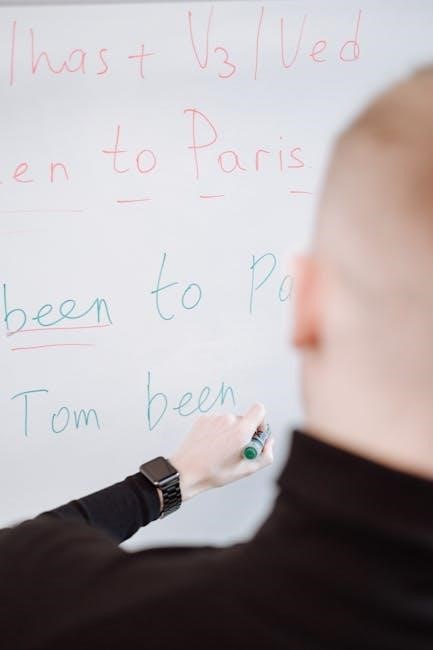
irregular past tense verbs worksheet pdf
Irregular past tense verbs deviate from standard conjugation rules‚ requiring memorization. They form the past tense through stem changes‚ not by adding “-ed.” These verbs are essential for constructing correct sentences and are often practiced through worksheets and exercises to enhance grammar skills and improve retention.
Definition and Importance of Irregular Verbs
Irregular verbs are words that do not follow standard past tense formation rules‚ often requiring memorization. Unlike regular verbs‚ they do not simply add “-ed” to form the past tense. Instead‚ their forms change unpredictably‚ such as “go” becoming “went” or “eat” becoming “ate.” Mastering irregular verbs is crucial for clear and accurate communication‚ as they are frequently used in everyday language. Worksheets and exercises are essential tools for learners to practice and memorize these verbs‚ improving grammar skills and language proficiency.
Common Examples of Irregular Past Tense Verbs
Common irregular past tense verbs include “go-went‚” “eat-ate‚” “write-wrote‚” and “see-saw.” These verbs do not follow the “-ed” rule‚ making them essential to memorize. Worksheets often feature exercises with these verbs‚ such as fill-in-the-blank and sentence writing activities. Examples like “I went to the park” or “She ate dinner” demonstrate their usage. Practicing these verbs through PDF worksheets helps learners build confidence and improve their grammar skills.

Structure of a Typical Irregular Past Tense Verbs Worksheet
A typical worksheet includes fill-in-the-blank exercises‚ multiple-choice questions‚ and sentence-writing tasks. These activities focus on correct verb forms‚ ensuring learners practice and reinforce irregular past tense usage effectively.
Fill-in-the-Blank Exercises
Fill-in-the-blank exercises are a cornerstone of irregular past tense verb practice. Students are provided with sentences containing blanks and a list of verbs‚ requiring them to write the correct past tense form. For example‚ “She _____ (go) to the store yesterday.” This activity enhances retention and applies verbs in context‚ making it an effective tool for mastering irregular forms. Many worksheets offer varied difficulty levels‚ ensuring learners from beginners to advanced can benefit and improve their grammar skills progressively.
Multiple Choice Questions
Multiple choice questions test learners’ ability to identify the correct past tense form of irregular verbs. Each question presents a sentence with a missing verb and offers 3-4 options. For example‚ “Yesterday‚ I _____ (sing) in the choir.” Options might include “sing‚” “sang‚” “singed‚” or “singes.” This format allows for self-assessment and reinforces recognition of irregular forms. Many PDF worksheets include answer keys‚ enabling learners to check their progress and understand common mistakes‚ thereby improving their mastery of irregular verbs effectively.
Sentence Writing Activities
Sentence writing activities challenge learners to use irregular past tense verbs in context. Students are given a set of verbs and must create grammatically correct sentences. For example‚ “She _____ (write) a letter to her friend yesterday.” This exercise helps learners understand proper usage and context. Worksheets often include prompts like short stories or dialogues‚ encouraging creative application. These activities‚ found in many PDF resources‚ are ideal for reinforcing retention and improving sentence structure‚ while also addressing nuanced irregular verb forms and their correct applications in everyday language.

Common Exercises and Activities in Worksheets
Worksheets often include fill-in-the-blank‚ multiple-choice‚ and sentence writing exercises‚ improving grammar and encouraging creative writing. These activities provide varied practice‚ making learning irregular verbs engaging and effective.
Matching Present and Past Tense Forms
Matching exercises pair present and past tense forms‚ helping learners recognize irregular verbs’ unique patterns. Students align verbs like “go” and “went” in tables or columns‚ enhancing memory retention. This activity improves verb recognition and sentence structure understanding‚ making it a foundational skill for mastering irregular past tense verbs effectively. Interactive and visually engaging‚ these exercises are widely used in worksheets to build confidence in using correct verb forms.
Spotting and Correcting Mistakes
Spotting and correcting mistakes involves identifying errors in verb usage and replacing them with the correct irregular past tense forms. Worksheets often provide sentences with intentional errors‚ allowing learners to practice editing. This activity reinforces understanding of verb conjugation rules and common pitfalls‚ such as confusing “saw” with “seen” or “eat” with “eated.” Regular practice helps improve accuracy and reduces mistakes in written and spoken language‚ making it an essential tool for mastering irregular verbs effectively.
Creating Short Stories with Irregular Verbs
Creating short stories with irregular verbs engages learners by applying them in context. Worksheets often prompt students to write narratives using specific verbs like “went‚” “ate‚” and “saw.” This activity enhances creativity and reinforces verb usage. By incorporating multiple verbs‚ learners practice their conjugation and proper placement. Stories also provide a meaningful way to track progress and retain irregular verb forms‚ making learning both effective and enjoyable for all language proficiency levels.

Benefits of Using Worksheets for Learning Irregular Verbs
Worksheets improve retention‚ enhance grammar skills‚ and build confidence through structured practice. They provide a clear‚ interactive way to master irregular verbs‚ making learning effective and engaging for all levels.
Improved Retention and Memorization
Worksheets are highly effective for improving retention and memorization of irregular past tense verbs. Through repetitive practice‚ students commit these verbs to long-term memory. Exercises like fill-in-the-blanks‚ multiple choice‚ and sentence writing reinforce learning. Structured activities ensure consistent exposure‚ making it easier to recall irregular forms. Answer keys provide immediate feedback‚ helping students track progress and focus on challenging verbs. Over time‚ this targeted practice enhances memory retention‚ enabling learners to use irregular verbs confidently and accurately in everyday communication.
Enhanced Grammar Skills
Engaging with irregular past tense verb worksheets strengthens grammar skills by fostering a deeper understanding of verb conjugation. These exercises help learners recognize patterns and exceptions‚ improving their ability to construct grammatically correct sentences. By practicing a variety of verbs in different contexts‚ students develop accuracy in using irregular forms‚ which is essential for clear and effective communication. Regular practice also builds confidence‚ allowing learners to apply their knowledge seamlessly in both written and spoken English.
Confidence Building Through Practice
Practicing irregular past tense verbs through worksheets fosters confidence in language use. Repeated exposure to exercises helps learners internalize verb forms‚ reducing hesitation in real-life conversations. As students master these verbs‚ they feel more assured in expressing themselves‚ whether writing or speaking. Worksheets provide a structured environment to build this confidence‚ allowing learners to tackle complex communication tasks with greater ease and precision.

How to Create an Effective Irregular Past Tense Verbs Worksheet
Design worksheets with clear instructions and varied exercises‚ such as fill-ins‚ multiple-choice‚ and sentence writing. Include answer keys for self-assessment and ensure activities cater to different learner levels‚ making practice engaging and effective for mastery of irregular past tense verbs.
Designing Clear and Concise Instructions

When creating a worksheet‚ ensure instructions are straightforward and easy to follow. Use bold headings and bullet points to separate exercises. Provide examples for each activity‚ such as demonstrating how to fill in the blanks or form past tense sentences. Clear instructions help students focus on learning irregular verbs without confusion. Avoid complex language and keep directions concise to promote effective practice and understanding.
Including a Variety of Exercise Types
A well-rounded worksheet should incorporate diverse activities to engage learners. Fill-in-the-blank exercises help memorize verb forms‚ while multiple-choice questions test recognition. Sentence-writing tasks allow practicing verbs in context‚ enhancing comprehension. Matching games‚ where present and past tense forms are paired‚ improve association skills. Storytelling exercises encourage creativity and practical application. Mixing these activities ensures learners develop a comprehensive understanding and retain irregular verb forms more effectively. This variety caters to different learning styles and keeps practice sessions engaging and dynamic.
Providing Answer Keys for Self-Assessment
Including answer keys in worksheets is crucial for self-assessment. Learners can verify their responses‚ identifying strengths and areas needing improvement. This feature fosters independence‚ allowing students to review mistakes and understand correct forms. Answer keys also save instructors time‚ enabling focused feedback. They promote accountability and encourage learners to take ownership of their progress‚ making practice more effective and reinforcing mastery of irregular past tense verbs through immediate validation and correction.

Using Worksheets for Different Learner Levels
Worksheets cater to various learner levels‚ from ESL beginners to advanced students. They provide tailored exercises‚ ensuring learners at every stage can practice irregular past tense verbs effectively.
Worksheets for ESL Learners
ESL learners benefit from structured worksheets designed to introduce and reinforce irregular past tense verbs. These resources often include fill-in-the-blank exercises‚ sentence writing‚ and matching activities. They focus on common verbs like “go‚” “eat‚” and “see‚” providing clear examples and answers. Such worksheets are ideal for classroom or self-study‚ helping learners build confidence in using irregular verbs correctly in everyday communication.
Worksheets for Children and Young Learners
Worksheets tailored for children and young learners use engaging activities to teach irregular past tense verbs. These include games‚ story-writing tasks‚ and matching exercises with visual aids. Simplified sentences and repetitive practice help young minds grasp common verbs like “went” and “ate.” The interactive nature of these resources makes learning enjoyable and effective‚ fostering early grammar skills in a fun and accessible way.
Advanced-Level Worksheets for Complex Irregular Verbs

Advanced worksheets focus on complex irregular verbs‚ challenging learners to use them in intricate sentences and contexts. Exercises include error correction‚ sentence transformation‚ and narrative writing. These activities help refine grammar skills and enhance vocabulary retention‚ ensuring mastery of even the most challenging irregular verbs for proficient language use.
Popular Resources for Irregular Past Tense Verbs Worksheets
Popular resources include printable PDF worksheets‚ online generators‚ and educational platforms offering customizable exercises. Websites like Teachers Pay Teachers and K5 Learning provide diverse activities for all skill levels.
PDF Worksheets Available Online
PDF worksheets for irregular past tense verbs are widely available online‚ offering convenient and printable exercises. Websites like K5 Learning‚ Mr. English‚ and ESL Printables provide free downloads. These worksheets often include fill-in-the-blank exercises‚ sentence writing prompts‚ and multiple-choice questions. Many resources cater to different learner levels‚ from beginners to advanced students. They typically include answer keys for self-assessment‚ making them ideal for independent practice. These PDFs are a valuable tool for reinforcing irregular verb memorization and application in sentences.
Tools for Generating Custom Worksheets
Custom worksheet generators allow educators to create tailored exercises for irregular past tense verbs. Tools like Python-based generators and online platforms offer flexibility‚ enabling the creation of specific verb lists and exercise types. These tools often produce PDF formats‚ making it easy to print and distribute. They cater to various learning levels and classroom needs‚ ensuring personalized practice for students. Additionally‚ some generators include interactive elements‚ enhancing engagement and effective learning outcomes for irregular verb mastery.
Recommended Websites and Platforms
Websites like Teachers Pay Teachers‚ K5 Learning‚ and Grammar.Cl offer extensive resources for irregular past tense verbs. These platforms provide downloadable PDF worksheets‚ interactive exercises‚ and customizable templates. They cater to diverse learner levels‚ from children to advanced ESL students. Educators can find pre-designed worksheets or tools to create their own‚ ensuring tailored practice. These resources are trusted by millions‚ making them reliable choices for effective grammar instruction and practice.
Tips for Effective Use of Worksheets in the Classroom
Incorporate worksheets into lesson plans to reinforce irregular verb learning. Encourage peer review‚ track progress‚ and provide feedback to ensure mastery. Regular practice boosts retention.

Incorporating Worksheets into Lesson Plans
Integrate irregular past tense verb worksheets into daily lessons to reinforce grammar concepts. Begin with a brief review of target verbs‚ then distribute worksheets featuring fill-in-the-blank‚ matching‚ or sentence-writing exercises. Pair activities with guided practice to ensure understanding. For advanced learners‚ include error-spotting tasks or short story creation using the verbs. Differentiate instruction by offering varied worksheet levels‚ ensuring all students engage meaningfully. Conclude with a class discussion or feedback session to address common mistakes and celebrate progress‚ fostering a supportive learning environment.
Encouraging Peer Review and Collaboration
Foster a collaborative learning environment by incorporating peer review activities. After completing worksheets‚ have students exchange their work with a partner to check for accuracy. This encourages active participation and reinforces learning. Guide students to provide constructive feedback‚ highlighting correct forms of irregular past tense verbs. Group discussions or pair work can also be used to solve challenging exercises collectively. Encourage students to explain their answers‚ promoting mutual understanding and confidence. This interactive approach not only enhances retention but also builds teamwork and communication skills‚ making learning more engaging and effective.
Tracking Progress and Providing Feedback
Regularly monitor students’ progress through their worksheets to identify strengths and areas needing improvement. Provide detailed feedback on incorrect answers‚ explaining the correct past tense forms. Use answer keys to ensure accuracy and guide self-assessment. Create a system to track individual performance over time‚ celebrating milestones and addressing persistent errors. Timely and specific feedback helps students grasp irregular verbs more effectively‚ fostering a sense of accomplishment and motivating continued practice.

Troubleshooting Common Mistakes
Identify persistent errors in irregular verb usage‚ such as incorrect stem changes or overgeneralizing “-ed” endings. Address these through targeted exercises and drills‚ ensuring clarity and understanding.
Identifying and Addressing Persistent Errors
Persistent errors in irregular verb usage often stem from incorrect stem changes or overgeneralizing “-ed” endings. Worksheets help students recognize these mistakes through exercises like fill-in-the-blanks and error correction. For example‚ exercises where students must spot and correct mistakes in sentences‚ such as changing “She writed a letter” to “She wrote a letter‚” reinforce proper usage. Additionally‚ sentence-writing activities and peer review encourage students to identify and fix their own errors‚ fostering a deeper understanding of irregular verb forms and improving accuracy over time.
Strategies for Mastering Difficult Irregular Verbs
Mastering irregular verbs requires consistent practice and effective strategies. One approach is to create flashcards with the base form on one side and the past tense on the other. Mnemonics‚ such as grouping verbs by similar patterns or using songs‚ can also aid memorization. Regular practice through fill-in-the-blank exercises‚ sentence writing‚ and matching activities helps reinforce retention. Additionally‚ leveraging online tools or apps that generate custom worksheets can provide tailored practice. Consistent review and repetition are key to overcoming the challenges of irregular verbs.
Mastering irregular past tense verbs is achievable through practice and structured learning. Worksheets offer a practical way to enhance grammar skills and confidence in using these verbs effectively.
Irregular past tense verbs require memorization and practice‚ as they don’t follow the standard “-ed” rule. Worksheets‚ including fill-in-the-blanks‚ multiple choice‚ and sentence-writing activities‚ are effective tools for learning. Resources like PDF worksheets and online generators provide varied exercises for different learner levels. Regular practice enhances retention‚ improves grammar skills‚ and builds confidence in using irregular verbs correctly. These materials are ideal for ESL learners‚ children‚ and advanced students‚ offering structured and engaging ways to master irregular past tense verbs.
Final Thoughts on the Importance of Practice
Consistent practice is crucial for mastering irregular past tense verbs. Worksheets and exercises help reinforce memory and understanding‚ making these verbs easier to use in everyday communication. Regular practice builds confidence and fluency‚ essential for effective language use. Utilizing varied activities ensures comprehensive learning‚ while resources like PDF worksheets provide accessible tools for all learners. Dedication to practice is key to overcoming the challenges of irregular verbs and achieving long-term proficiency in English grammar.


Leave a Reply
You must be logged in to post a comment.